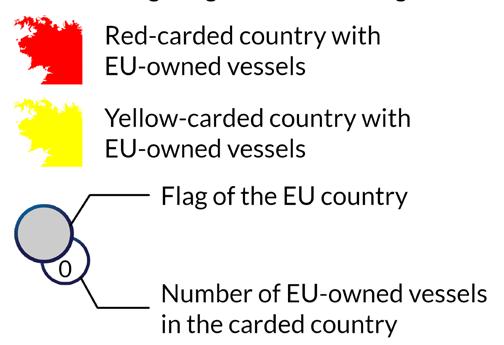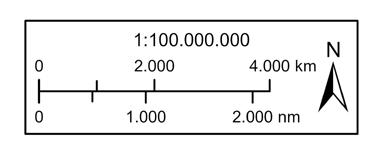Problematic EU ownership of fishing vessels in countries that fail to tackle illegal fishing

1. The problem: secrecy and ‘flags of convenience’ fuel illegal fishing
A lack of transparency in the global fishing sector is enabling illegal, unreported, and unregulated (IUU) fishing. IUU fishing depletes fish stocks, destroys marine habitats, distorts competition, and weakens coastal communities – particularly in developing countries. It is a high-benefit activity – often associated with human, drugs, and weapons trafficking, tax fraud, money laundering, and labour right abuses – that flourishes under conditions where transparency is lacking and governance loopholes exist.
IUU fishing operators often target areas with weak national or international controls to illegally harvest marine resources. They take advantage of ‘flags of convenience’: registering their vessels under a foreign flag that bears no association with the nationality of the vessel’s owner or operator. Indeed, under international law, the country under which a vessel operates – known as the ‘flag state’ – is responsible for controlling the vessel’s fishing activities. Technically, under international law there must be a ‘genuine link’ between the fishing vessel and the country whose flag it flies. In practice, this is not always the case and some vessels pick whichever
flag allows them to access new fishing grounds or evade fisheries rules or penalties. Some countries also allow ship owners to remain anonymous using shell companies, which makes it nearly impossible to identify the real owners.1
The widespread use of flags of convenience by fishing vessels is exacerbating the opacity of the fishing sector, hindering efforts to identify and sanction the ultimate beneficiaries of IUU fishing activities − the natural person who owns the corporate entity.2 This massive lack of transparency facilitates transnational organised crime, perpetuates corruption, and contributes to the over-exploitation of the oceans.
These opaque ownership structures are at the heart of the flags of convenience issue. Detecting IUU fishing at sea is already a challenge for authorities. The use of flags of convenience, tax havens, and arrangements to hide the identity of an end-owner (beneficiary) across different jurisdictions acts as a cloaking process that is almost impenetrable for any authority. The ultimate beneficiaries of illegal fishing are thus at low risk of detection, capture, and sanction.
The European Union (EU) has an ambitious law in place to tackle IUU fishing internationally,3 under which it can ban seafood exports from third countries that do not act to fight IUU fishing. Many of the countries that have received a warning (yellow card) or trade ban (red card) from the EU under this law have failed to abide by their responsibilities as a flag state (see Box below). Some of these countries have lax regulations or limited capacity to monitor and control vessels flying their flag, with resulting negative ecological and economic impacts.
The EU carding scheme Box:
References:
1 Galaz, V. et al. (2018). Tax havens and global environmental degradation. Nature Ecology and Evolution, 2, 1352-1357.
2 North Atlantic Fisheries Intelligence Group and INTERPOL. (2017). “Chasing Red Herrings: Flags of Convenience and the Impact on Fisheries Crime Law Enforcement”. Available at: https://www.interpol.int/content/download/5146/file/Chasing Red Herrings Report.pdf
3 Council Regulation (EC) No 1005/2008 of 29 September 2008 establishing a Community system to prevent, deter and eliminate illegal, unreported and unregulated fishing.
The EU IUU Regulation establishes a carding scheme for the identification of non-EU countries that are failing to implement adequate measures to prevent and deter IUU fishing.
Yellow card (warning)
The European Commission can pre-identify (or ‘yellow card’) ‘non-cooperating third countries’ that are not supporting the fight against IUU fishing. Before doing so, the Commission conducts rigorous fact-finding missions to evaluate the compliance of these countries with their duties under international law. The Commission and the authorities of a non-EU country open a lengthy dialogue to assess the systems that country has in place to prevent IUU fishing and its compliance with international rules. After a country has received a yellow card, it is expected to undertake substantial reforms to address the identified shortcomings.
Red card (trade ban)
If reforms are not carried out, a yellow-carded country can be formally identified as ‘noncooperating’ in the fight against IUU fishing and issued a ‘red card’. This results in a ban on EU imports of fish products caught by vessels flying the flag of the red-carded country. It also prohibits EU vessels from fishing in the waters of that country.


It is illegal under EU law to fish in a country that received an EU seafood trade ban; it is also illegal to export an EU fishing vessel there. However, an EU company or citizen is allowed to be the end-owner (beneficiary) of a vessel using the flag of a country subject to such a ban.
Whilst not illegal under EU law, owning vessels that use the flags of countries which fail to tackle IUU
fishing is contrary to the objectives of the Common Fisheries Policy. This practice takes advantage of non-EU countries’ looser controls and management rules, and facilitates possible engagement in IUU fishing activities, while the financial proceeds flow back to the EU.
Article 39 of the EU IUU Regulation states that EU nationals shall neither support nor engage in IUU fishing, and that Member States shall take appropriate action on nationals engaging in IUU fishing. Article 40 further stipulates that Member States shall encourage their nationals to notify any interests in fishing vessels under a non-EU flag, and to further submit a list of the fishing vessels concerned to the European Commission.
However, a recent study released by the European Commission determined that only six Member States (Austria, Cyprus, Estonia, Malta, Portugal and Spain) have the necessary national laws in place to encourage national citizens to notify any financial interests in fishing vessels using non-EU country flags. However, not all the measures put in place by those six Member States are effective 4 Moreover, the study also concluded that there is a (nearly) non-existent sanctioning of nationals that engage or support IUU fishing activities outside EU waters.
Due to the current lack of public information, it is unclear how many EU nationals are possibly benefitting from IUU fishing, which has led to a situation where very little action is taken to stop this practice. This goes against the EU’s zero-tolerance policy on IUU fishing and is a clear infringement of EU law.
To stop this inaction, it is crucial that information on beneficial ownership of EU nationals of non-EU vessels become publicly available. This increased transparency would allow fisheries managers and enforcement officials to determine who is legally accountable for – and profiting from – illegal activities.









